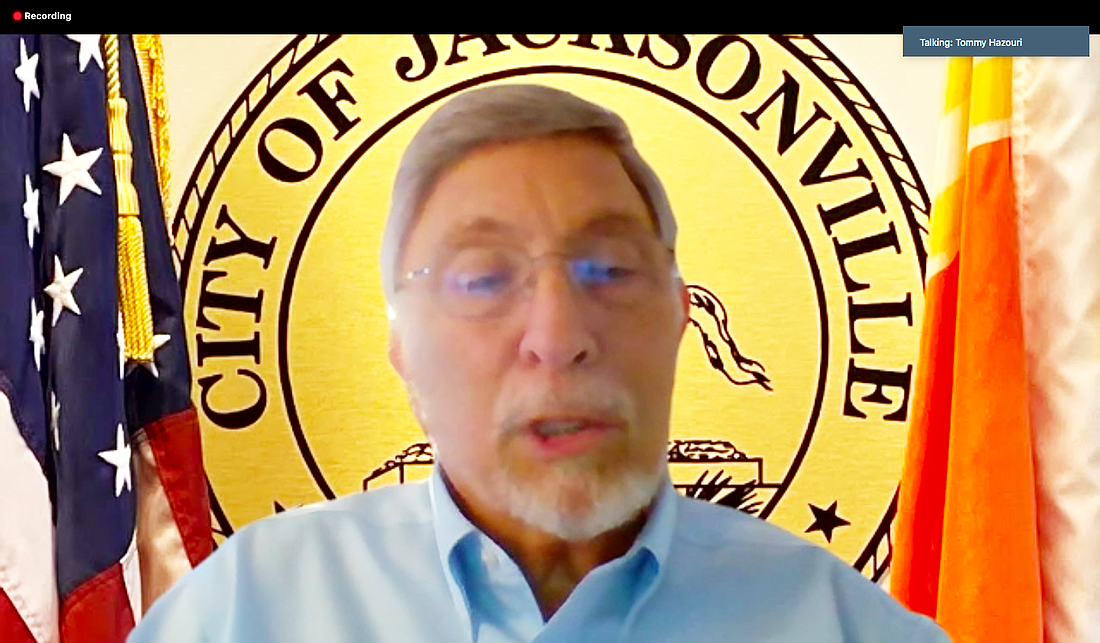
City Council President Tommy Hazouri told the JAX Chamber Downtown Council on Dec. 4 he thinks the city’s $245.3 million incentives deal for Jacksonville Jaguars owner Shad Khan’s Lot J project will “probably pass.”
“But the question is when,” Hazouri said. “To try to do it overnight before Christmas, a hurry-up offense if you will, to me, that doesn’t work. I think a few more weeks to make sure we get those questions asked or answered, then we’ll have a better idea of voting up or down.”
Hazouri told the group he is “in no rush” to get the deal, Ordinance 2020-648, through City Council by its next meeting Dec. 8.
The 8 a.m. virtual meeting was Hazouri’s first with Downtown stakeholders since he deferred the Lot J bill Dec. 3, potentially blocking the legislation from a final vote next week.
City Council would need a two-thirds vote — 13 of the 19 members — at its next meeting to discharge the bill from committee and another two-thirds to pass it.
Hazouri told the group that because the legislation does not include a series of amendments that add requested changes by the Downtown Investment Authority and City Council Auditor, the bill needs a special meeting to give it appropriate time.
Project shrinks
Hazouri said he doesn’t like that Khan and development partner The Cordish Companies reduced the scale of the mixed-use entertainment, residential, retail and hotel project while the public investment dollars remain relatively unchanged.
A DIA report released Dec. 2 shows the latest development agreement allows the Jaguars and Cordish to reduce the project’s Class A office space from 40,000 square feet to a minimum 35,000 square feet; the number of luxury, mid-rise apartment units from 400 to 350; parking spaces in the city-owned garage and surface lot from 700 to 600 spaces; and Lot J’s luxury boutique hotel to a 120-room minimum.
Khan’s Lot J proposal from 2019 included a 300-unit residential tower and the Live! District but 120,000 square feet of Class A office space and a guaranteed 200-room hotel.
At the same time, the DIA revised the cost of the city incentives package negotiated by Mayor Lenny Curry’s administration from $233 million to $245.3 million by including the value of the land to be given to the developers.
“You don’t see a correlation of scaling down on the city’s part — on what we contribute,” Hazouri said. “I think what we’re looking for is some safety. They call it a clawback, but something that tells us if you sell the team … and you leave (Lot J) you still have the obligations there.
“But if you pull out and go to London, or wherever you go, I don’t want to be stuck with a $230 million (bill). If you say you’re not going, why wouldn’t you have a clawback like that?”
Hazouri acknowledged Jaguars President Mark Lamping’s comments Dec. 3 that the Lot J and the Shipyards comprise one of three elements Khan sees necessary in keeping NFL football in Northeast Florida. The others are renovations to TIAA Bank Field and fielding a better football team.
The Council president said the only clawback concession the Jaguars have agreed to is a five-year prohibition on selling Lot J’s 120-250 room hotel and two residential mid-rise buildings.
Hazouri said Khan and Cordish “have been kind,” and blames the rush to approve Lot J on the Curry administration.
“If they (the Jaguars) were to leave, which I doubt that they’ll do, the mayor has no one to blame but himself. Don’t blame the Council for doing their jobs. I would blame you for not doing your job in the negotiations,” Hazouri said.
“Never negotiate out of fear, said Roosevelt, but never fear to negotiate.”
Filling the tax gap
Hazouri also discussed Downtown development more broadly, lending support to the Museum of Science and History’s proposed relocation to the Shipyards; the renovation and restoration of the former Independent Life building into a residential tower and grocery store; the proposed Emerald Trail system; and DIA’s push for park space and development at the former Jacksonville Landing site.
He said other issues, like the city’s aging septic tanks and initiatives like housing blight being considered by the Council’s Social Justice Committee, will need more revenue to spend by the city.
When asked if he supported raising property taxes, Hazouri said he’s “not hesitant to do what we need to do.”
“I think you might have seen that happen this year if it wasn’t for COVID-19,” he said. “It’s not about raising taxes but it’s about going back to where we were.”